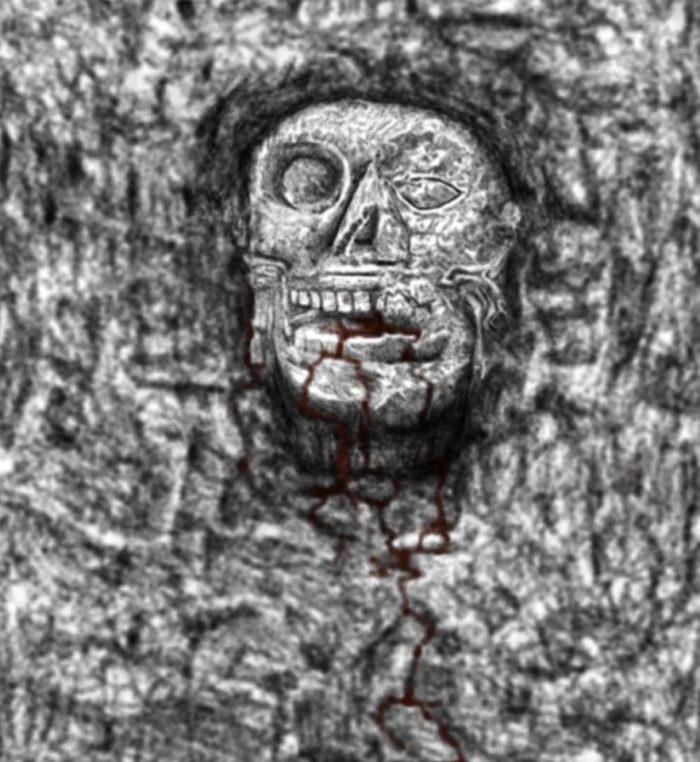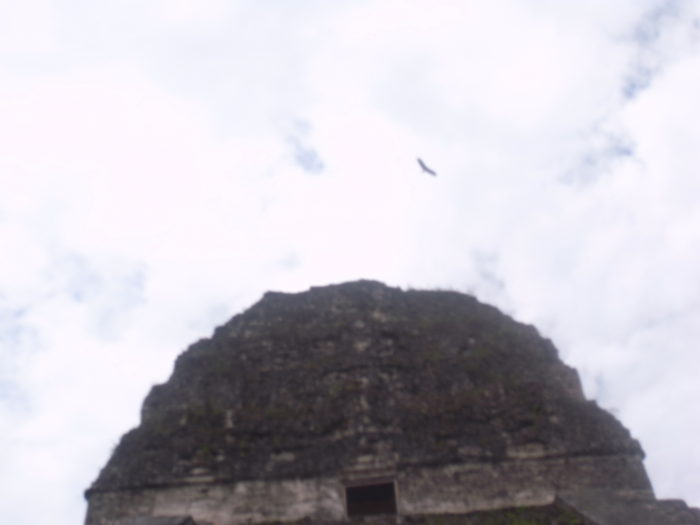
“Detail shows the face of Stela D which rises 12 ft beside the altar of sacrifice with a death god effigy. The stele represents the 13th ruler of Copán, King Waxaklajun Ub’aah K’awiil (in English, Lord 18 Rabbit), showing half of his face as it was sculpted, and the other half stripped as it would look in Death.” – Akherra Phasmatanás
Article by David Rosales.
Desolation is a full-on ambient project that blends simple and solid harmonic backgrounds, repetitive phrases of a dark coloring, with recorded lamentations both human and otherwise. The aim seems to be to produce the whole array of impressions encapsulated within that single word: desolation. The music’s structure is progressive and appears to be segmented in an episodic manner, which normally implies a loss of continuity between sections. This unwanted effect is expertly avoided by providing smooth transitions, interleaving ambient soundscapes, nature sounds, vocal improvisations, all of which bring variety within a strongly directly concept that never loses content density or a strong sense of purpose. Furthermore, the album being simply distributed between two long tracks reinforces its unity and the requirement that the audience listens to the whole work as if commencing a mental journey, which once begun must be seen through to its very end.
Chorus From The Ruins achieves the efficiency of the best ambient classics without the need for overcomplications of any kind, be they technological or musical, setting aside as well convoluted abstractions that leave the listener wondering if he is still listening to music. As with the rest of the work by this musician, Desolation delivers an extremely raw yet intuitively refined work that revives and unveils deep human (only human?) experience. Desolation works by arranging sounds that smoothly progress and are arranged to arrive to definite points. However, as true ambient, the conclusion is not a monumental cadence leading to the majestic resolution of all musical disagreements throughout the oeuvre. Ambient is typically simpler and more subtle, the philosophical implications being significantly different than the allusions to immanent destiny pouring forth as extension from the Godhead towards unmovable doom which lie at the center of the Common Practice Period. Closer to a dense soundtrack in this respect, the ending towards which all progress builds has a conceptual, an almost verbal, quality to it that is predominantly emotional in the earthiest and most bestial of senses, leading to an ending that could be described as both tragic and cruel, rather than bleak or depressive.
— Un Poeta, Luz, un verdadero poeta, es un ser omnipotente en el vasto dominio de las Ideas, de las Palabras y de los Símbolos. Transforma en flores y músicas la materia inerte del idioma. Vuela por el Infinito, dialoga con los Elementos, somete a su voluntad las formidables fuerzas ocultas. Su cabeza es como una ánfora sagrada llena de secretos y de prodigios. Pone su espíritu en cada vocablo y hace de las voces rosarios trémulos de emociones y de melodías. Es águila y alondra, es rayo y es céfiro. En su enorme corazón palpitan todos los amores y todos los dolores de la Humanidad y su latido es como el retumbo del trueno y del mar. Es, en fin, la más asombrosa manifestación de las energías eternas, porque la Gloria prolonga su poder y su personalidad a través de las edades. ¡Es un hombre, y más que un hombre, o, por lo menos, el que está más cerca de Dios!
— Froylán Turcios, ‘El Vampiro’
Very little compares to the work of Desolation in this Chorus From The Ruins with its original taste as a hybrid — nay, a synthesis of ambient, soundtrack and dungeon synth. What makes this work unique in its transcendence is that from an artistic point of view, it shares with the best music a holistic character that moves purpose to a finality beyond any verbal dissection by being far more than the sum of its parts, its influences or its methods. Any of the building blocks we may identify on its frontispiece can never reveal the mystery of the vast construction. Does an architectural description of a gothic cathedral actually capture the essence of that dark and pervertedly unholy place? Is the energy of the Mayan temple complex transmitted through the detailed accounts of historians and anthropologists? The author of Chorus From The Ruins is motivated by more than emotion, but also more than merely rational thought, and rather than being possessed by the daemon brought forth by each musical and artistic artifice, moving through technique towards the unseen unity beyond all.
Tracklist:
First Chapter
Demo I: ‘Ritual For The Tyrants’
– Rites of Blood
– Blood on Stone
– Ritual of the Bloody Vengeance
((15:00))
Second Chapter
Demo II: ‘Dawn Of The Cult Of Cruelty’
– Dawn of the Cult of Cruelty
((27:05))
SUB SPECIE AETERNITATIS
Tags: 2008, Ambient, chorus from the ruins, dark ambient, demo, demos, desolation, review




Great review. Maybe you could focus on other 2016 reviews too. Like for instance Matthias Steele, a band similar to Iced Earth only better. They released their third album a few months ago.
https://www.youtube.com/watch?v=z7oKmMcaBWA
Thanks. It’s not terrible but has some generic riffs.
David, your review got me interested to hear this music. However, I can’t find any samples online, nor can I even find any other online reference to the existence this release. Was it released by a label? How did you get hold of a copy of it?
It was handed to me by hand. I haven’t found record of it on the Internet outside some obscure catalogue whose name I can’t remember at the moment, neither have I seen uploads, perhaps because the original format is cassette.
I know it’s sort of fucked up when you are really interested.if you are, I bet you are going to get the opportunity to listen to it sooner or later, if you are active enough.
I was thinking the same thing. Anyway, another first rate review, David, just a pleasure to read in itself. It makes one think that just as there is a thing called “paper architecture”, or visionary architecture which exists only in concept, never actually to be built, there could be music that isn’t actually played but is signified through language alone, isn’t quite poetry but is charted out and defined through skilled use of words alone, made only to be “listened to” in pure imagination. One can hear it in the “inner ear”, not with the actual ears, and it’s made to stay that way.
It makes me think of how Lovecraft in his short story The Music of Erich Zann so evocatively describes the sounds coming from the “viol” and the uncanny and even supernatural power of them.
Your writing, appealing strongly to the intellect but also to the imagination, dwells in that region where it can be appreciated in its own right, before hearing the actual music. After reading your accounts one even grows hesitant to listen to the actual music, for fear of being disappointed.
Your words are too kind, John D.
The last thing you said reflects what several people expresses regarding Abyssum. I sustain the judgement that the fault is with the listeners “inner” understanding and not the music’s reach, despite its technical simplicity from the European classical music point of view.
Someone who has become prominent in my life taught me an important lesson in reading books and ideas, which may also be applied to the listening of music. This person told me to distrust everything, but to let myself bask in the content anyhow. This allows for inruition to play a more prominent role. This is not to be confused with “following your feelings and what you like”. No. Criticism is not suspended, objectivity is not suspended. But they key is to experience it fully and to the core instead of setting up mental barriers which the object in question must defeat in certain order.
But I think everything has its place and it’s time. I’ll have to close the gates again in order to keep sharpening my perception. And open them again after that. Learning needs these cycles. MOUNTAINS ARE MOUNTAINS, yet they are more, and no particular entity at all, and SI on…